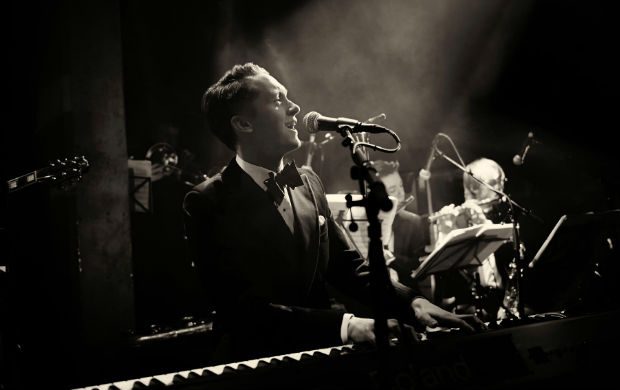Where did your love of music come from?
I grew up in the seaside town of Scarborough, North Yorkshire, and started performing on the variety scene aged four. I would sing quite a range of music on stage and then figure out how to play it by ear on the piano at home. Classical singing lessons started when I was seven and I played the piano for the choirs, orchestras and jazz bands at school. It was, in fact, my chemistry teacher, a former concert pianist, who gave me masterclasses in pieces by Rachmaninoff, Chopin and Liszt. This unorthodox journey led me to study singing at Trinity Laban Conservatoire of Music and Dance, where I have just finished my Master’s degree.
What musicians have inspired your journey?
I once asked the advice of Tony Bennett during a livestreamed Q&A, regarding tips for the start of my career. He said that to become a great singer you should imitate instrumentalists, rather than other vocalists. My school years were dominated by listening to legendary classical artists, including pianist Vladimir Horowitz, violinist Jascha Heifetz and tenor Franco Corelli. Alongside them was the God of jazz piano, Art Tatum, Count Basie’s orchestra, and of course, Frank Sinatra. I never separated these figures by genre. To me, they all represented a kind of artistry that was steeped in elegance and underpinned by visceral passion. There is no real difference between the stratospheric bel canto singing of Corelli and Marshal Royal’s shimmering lead alto, which adorned Basie’s saxophone section.
Who would you most like to collaborate with?
I’ve already mentioned him, so if Tony Bennett called for a duet, I wouldn’t turn him down! He’s one of the last remaining links to the golden age of American popular song and evidence that performing with sound technique can keep you singing until at least 93!
How does performing differ to conducting?
Performing as a singer/instrumentalist and conducting are quite similar, in that they both have two elements: pre-planned ideas and reactionary ideas. Part of what I love about music performance is being inspired on the spot by others on stage, moulding my part of the performance in response to what they do.
The two differ in the way that singing or playing an instrument represents direct communication with the audience, whereas a conductor has to almost telepathically transmit their interpretation of the piece through the orchestra to the listener. The magic of this is that the mass of musical personalities in front of you can make each performance uniquely captivating.
Do you prefer one or the other?
Performance and conducting have both been vital parts of my journey as a musician, so I’d have to be greedy and say I love them equally. Each has informed the other and I’ve been lucky to have worked with amazing artists in both capacities.
How is the world of jazz changing?
The challenge for musicians today is to avoid being boxed into categories that stifle creativity. I’ve always believed that for our art form to thrive, musicians must derive their inspiration from a broad pool. If you look back to the cultural centres of a century ago, such as New York and Paris, you can see a genuine cross-pollination of ideas between different artistic disciplines and musical genres. From my perspective, returning to this way of thinking is vital to reinvigorating all art music for the twenty-first century. This summer, I took over the late shows at The New Generation Festival in Florence, playing jazz alongside a wider programme of opera, classical chamber and symphonic music. Initiatives like the NGF help to bring musicians of all backgrounds together in a wonderful melting pot.
What are your favourite London music venues?
I spent a lot of my time as an undergraduate at the Royal Festival Hall, watching the very best of the UK’s orchestras; it’s a hall with a great sense of theatre and occasion. Clubs like The Jazz Cafe, Camden, present a wonderful opportunity to put across an intimate song to an audience at a very close proximity. Because of its great sense of cultural history, the London Palladium has always held a special place in my heart. It was the place I saw my favourite musical as a child and represents the dream venue.
What exciting plans do you have for the autumn?
In late September, I’m giving a series of concerts on Lake Lugano, Italy, performing the Great American Songbook. The final concert will explore both the stage and concert works of George Gershwin, with violinist Rosie Judge and trumpeter/bassist Harry Evans. The Gershwin theme remains, as soprano Anush Hovhannisyan and I continue to tour the show we launched at Crazy Coqs, Piccadilly, in June. Moving into the New Year, I’m looking forward to returning to The Jazz Cafe to sing with my orchestra.










